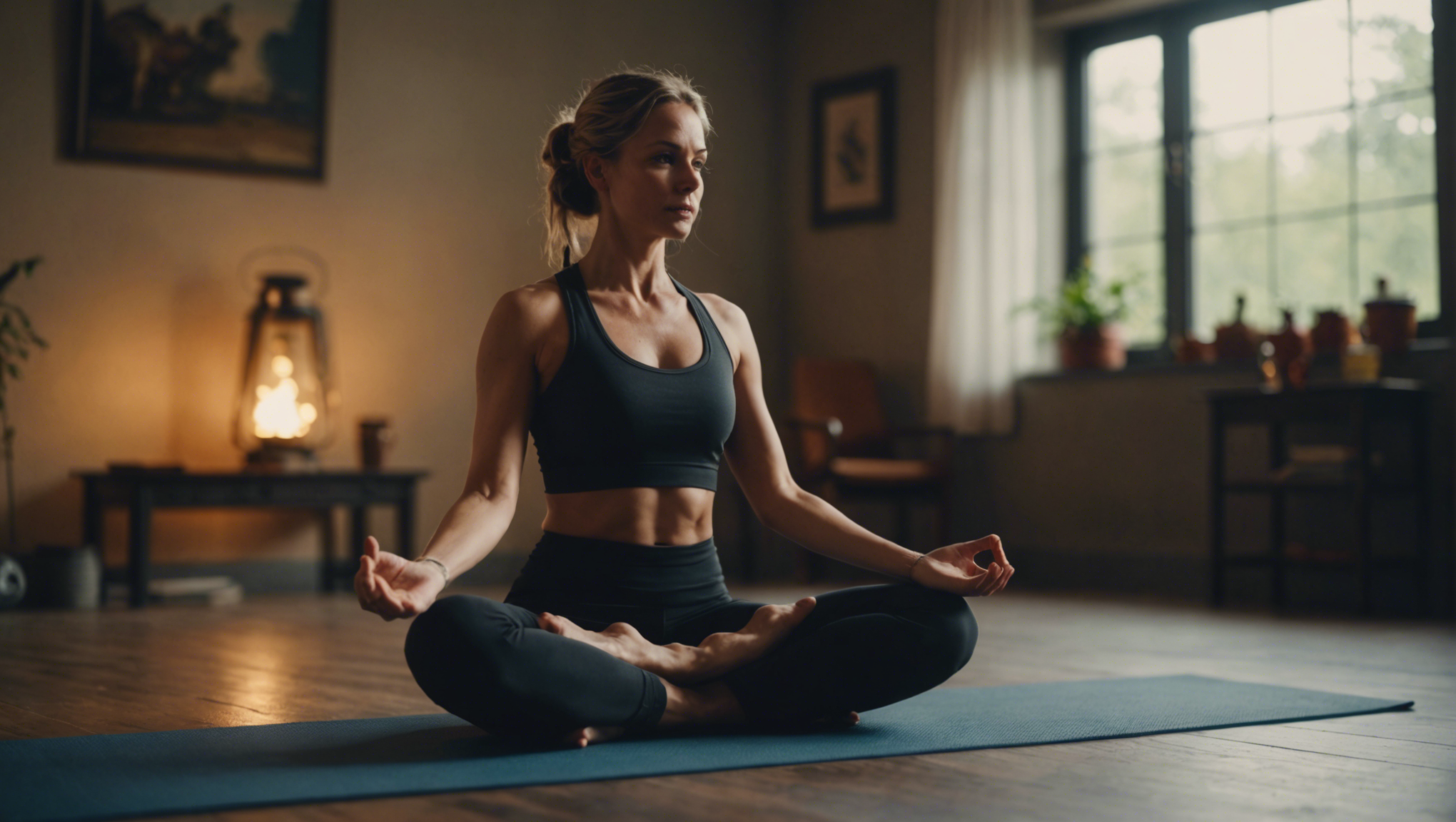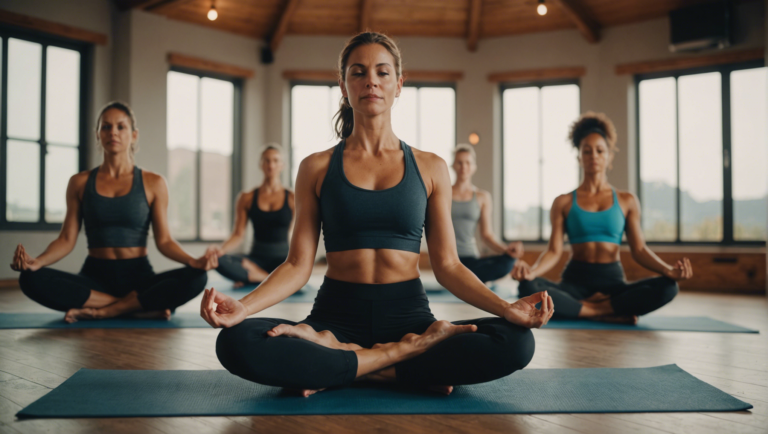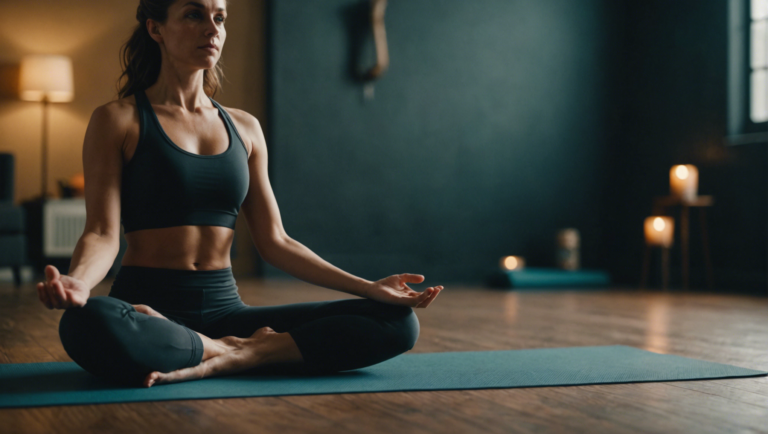Unveiling The Reasons: Why Yoga Is The Best Exercise
Unveiling the Reasons: Why Yoga is the Best Exercise for Mind, Body, and Spirit
Yoga, a time-honored practice that dates back thousands of years, has emerged as one of the most effective exercises for enriching the mind, body, and spirit. Its holistic approach to well-being distinguishes it from other fitness routines, offering a unique blend of physical postures, breathing techniques, and meditation. This article delves into the multifaceted benefits of yoga, presenting compelling reasons why it stands unparalleled in the realm of exercise.
The Comprehensive Benefits of Yoga
Yoga’s multifaceted nature means it not only improves physical health but also enhances mental and emotional well-being. Unlike exercises focusing solely on physical strength or endurance, yoga encompasses a broader spectrum of benefits. It builds muscle and enhances flexibility, certainly, but also promotes mental clarity and emotional resilience. The synchronization of breath with movement anchors the mind in the present, fostering a state of meditative awareness that is as rejuvenating for the psyche as it is for the body.
Enhancing Physical Health and Flexibility
One of the most visible benefits of yoga is the improvement of flexibility. The gradual stretching of muscles and loosening of joints through various poses significantly increases range of motion, reducing the risk of injury and enhancing the body’s ability to perform both in daily activities and other physical pursuits. Moreover, the strengthening postures of yoga build core stability, balance, and overall muscular strength, which are vital for a healthy physique.
Bolstering Mental Well-being Through Meditation and Breathwork
The practice of yoga incorporates profound mental and emotional dimensions, primarily through meditation and controlled breathing. These elements foster a deep sense of inner peace and mental clarity, mitigating stress and anxiety. Regular practitioners often report a notable improvement in focus, memory, and cognitive function, attributing these gains to the meditative aspects of yoga. The breathwork involved, known as Pranayama, further enhances lung capacity and oxygenates the blood, contributing to improved physiological and psychological health.
A Gateway to Enhanced Spirituality
Yoga stands apart from other forms of exercise by offering a pathway to spiritual exploration and growth. The practice encourages self-reflection, mindfulness, and a deeper connection with one’s inner self, facilitating a journey of personal and spiritual development. This aspect of yoga resonates with those seeking not just physical fitness but also a sense of purpose and serenity in their lives.
Supporting Holistic Health and Chronic Disease Management
Numerous studies have underscored yoga’s efficacy in managing, and sometimes mitigating, chronic health conditions such as hypertension, heart disease, diabetes, and mental health disorders like depression and PTSD. Yoga’s holistic approach emphasizes the unity of mind and body, fostering an environment conducive to healing and long-term health maintenance. This makes yoga not just an exercise but a lifestyle choice for those looking to sustain their health and well-being through natural, holistic practices.
The Social and Community Aspect of Yoga
Yoga cultivates not only personal growth but also a sense of community and connection. Classes and group sessions provide opportunities for social interactions, fostering relationships based on shared values and common interests. This communal aspect of yoga enhances its benefits, contributing to a supportive environment that motivates continued practice and collective well-being.
By offering a comprehensive approach to health that nurtures the mind, body, and spirit, yoga transcends traditional forms of exercise. Its adaptability to different skill levels and needs makes it accessible to everyone, irrespective of age, fitness level, or health status. Whether seeking physical improvement, mental clarity, emotional stability, or spiritual growth, yoga provides a holistic pathway to achieving these goals. In the pursuit of overall well-being, yoga emerges not just as an exercise but as a guiding philosophy for a balanced and enriched life.
The Science Behind Yoga: Exploring its Physical and Mental Health Benefits
Unraveling the Mysteries: How Yoga Transforms Your Body and Mind
The time-honored practice of Yoga, originating from ancient India, has traversed beyond its cultural genesis to become a globally embraced method for enhancing overall well-being. This exploration reveals the multifaceted physical and mental health benefits yoga offers, underpinned by scientific studies and physiological evidence, painting a clear picture of why this practice has stood the test of time.
The Physical Health Enhancements of Yoga: A Scientific Perspective
Yoga’s impact on physical health is profound and well-documented. It goes beyond mere physical fitness, offering a holistic approach to well-being. Notably, yoga has been proven to improve cardiovascular health, strengthen muscles, and enhance flexibility.
Cardiovascular Improvements: Studies have shown that regular yoga practice can lead to a significant decrease in blood pressure and heart rate, contributing to a lower risk of heart disease. This is largely attributed to yoga’s meditative elements, which aid in stress reduction, a known risk factor for heart problems.
Muscle Strength and Tone: Unlike conventional exercises that focus on specific muscle groups, yoga provides a comprehensive workout that enhances muscle tone, strength, and endurance holistically. The various postures, or ‘asanas’, require the engagement of multiple muscle groups, fostering a balanced development of muscular strength.
Flexibility and Posture: Yoga’s emphasis on stretching is instrumental in enhancing flexibility and correcting posture. The poses are designed to increase the range of motion in joints and muscles, promoting fluid movement and reducing the risk of injury.
The Mental Health Advantages: Delving into the Psychological Impact
The psychological benefits of yoga are as significant as the physical, offering a sanctuary for the mind amidst the cacophony of modern life. Yoga incorporates mindfulness and breathing techniques that work in tandem to enhance mental health.
Stress Reduction: Yoga’s meditative practices are a cornerstone in stress management. The focus on deep, controlled breathing helps calm the mind and reduce the physical manifestations of stress, such as elevated heart rate and hypertension.
Improved Concentration and Mental Clarity: The practice of yoga demands mental focus, which, over time, enhances concentration and cognitive functions. Regular yoga practitioners often report heightened awareness and mental clarity, contributing to improved productivity and creativity.
Emotional Balance: By fostering an inward focus and awareness of breath, yoga promotes emotional stability and resilience. It assists in the management of emotions, helping practitioners maintain equanimity in the face of life’s ups and downs.
The Intersection of Science and Spirituality in Yoga
Yoga stands at the crossroads of science and spirituality, offering a unique blend that caters to both the body and mind. This holistic approach is what sets yoga apart from other forms of exercise. The scientific community continues to explore and validate the benefits of yoga, providing a solid foundation for its practices.
The practice of yoga induces a state of restorative rest, which triggers the body’s natural healing processes, enhancing physical health, and promoting mental well-being. This restorative aspect is pivotal, offering insights into how yoga facilitates a deep, symbiotic healing process, distinguishing it from other wellness practices.
Final Thoughts on the Transformative Power of Yoga
The exploration of yoga’s impact through the lens of science reveals a compelling narrative of holistic health. Yoga offers a unique confluence of physical exertion, mental clarity, and emotional stability, reinforced by scientific research. Its adaptability and accessibility further underscore yoga’s role as a comprehensive approach to well-being.
Whether one seeks to enhance physical fitness, cultivate mental peace, or both, yoga provides a viable, scientifically backed pathway to achieving those goals. As we continue to unveil the myriad benefits of this ancient practice, it’s clear that yoga holds the key to unlocking a healthier, more harmonious life.
Yoga Versus Traditional Gym Workouts: A Comparative Analysis
When deciding between yoga and traditional gym workouts, individuals seek to understand which fitness regime best serves their needs, considering personal goals, lifestyle, and physical capabilities. This comparative analysis dives into the core aspects of each, including health benefits, mental wellness, versatility, and commitment requirements, providing a nuanced perspective for those standing at this crossroads.
Unraveling Health Benefits
Yoga, an ancient practice with roots stretching back millennia, offers a holistic approach to health. Not just a physical workout, yoga incorporates breath control, meditation, and poses designed to enhance flexibility, strength, and balance. Regular practitioners report improved posture, relief from back pain, and increased joint mobility. Moreover, yoga’s emphasis on mindfulness and connection between the mind and body contributes to a robust cardiovascular health, echoing the rewards of moderate-intensity exercises.
On the flip side, traditional gym workouts are more varied in nature but generally focus on physical conditioning, targeting specific muscle groups for strength, endurance, and aerobic fitness. Weightlifting, cardio machines, and bodyweight exercises contribute to substantial muscle gain, weight loss, and an upsurge in metabolic rate. For those seeking visible fitness results or aiming to boost physical performance, gym routines might offer a faster track.
Mental Wellness and Stress Relief
The realm of mental wellness is where yoga truly shines. Its meditative elements foster a serene mind, reduce stress, and enhance overall mental health. By encouraging practitioners to stay present, yoga helps diminish anxiety and cultivates a sense of inner peace, making it an invaluable tool for emotional well-being in today’s fast-paced world.
Conversely, traditional gym workouts, while primarily focused on physical health, also confer significant mental health benefits. Physical activity is known to release endorphins, the body’s natural mood elevators, combating stress and depression. Although it may lack the deliberate mindfulness component of yoga, the gym can still be a powerful ally against the blues, offering a different, yet effective, type of mental health support.
Assessing Versatility and Accessibility
Yoga’s adaptability is one of its most appealing traits. From restorative practices like Yin Yoga to the more physically demanding Ashtanga or Vinyasa flows, there is a style for every age, ability, and fitness level. Additionally, yoga requires minimal equipment—a mat, and perhaps a few props like blocks or straps—making it easily accessible to many.
Traditional gym workouts, while versatile in the range of exercises available, can sometimes be limited by the need for specific equipment or access to a fitness center. This necessitates a higher level of commitment in terms of both time and financial investment. However, the gym excels in offering tailored options for targeted fitness goals, from bodybuilding to cardiovascular improvement, catering to a diverse audience.
Commitment to Practice
Commitment levels can significantly impact an individual’s choice between yoga and gym workouts. Yoga, with its emphasis on gradual progress and personal journey, encourages long-term, sustained engagement rather than quick fixes. It is an ongoing practice that evolves with the practitioner, often becoming a lifestyle rather than merely a form of exercise.
Traditional gym routines, while they can certainly be adapted to long-term fitness goals, often follow a more structured progression with specific objectives in mind. They may require regular adjustment to avoid plateaus and maintain progress, necessitating a different kind of commitment, often guided by clear benchmarks or physical milestones.
The choice between yoga and traditional gym workouts hinges on personal preferences, goals, and lifestyle considerations. While yoga offers a comprehensive approach that harmonizes body, mind, and spirit, gym workouts provide a dynamic path to physical fitness and strength. Ultimately, the decision should align with an individual’s aspirations, be they for mental tranquility, physical health, or both, recognizing that each path offers its own unique benefits and challenges.
Incorporating Yoga into Your Daily Routine: Practical Tips and Strategies
Embarking on a Yoga Journey: Essential Tips
Discovering Your Yoga Practice
Embarking on the journey of weaving yoga into your daily life requires an understanding of what yoga means to you personally. This ancient discipline is more than just physical postures; it’s a holistic approach to well-being, integrating mental, physical, and spiritual health. To begin, set clear intentions. Ask yourself why you are drawn to yoga. Is it to reduce stress, enhance flexibility, or maybe cultivate a sense of inner peace? Identifying your goals will guide your practice and help keep you motivated.
Crafting a Personalized Yoga Routine
Creating a yoga routine that resonates with your lifestyle is crucial. Start by choosing the style of yoga that aligns with your objectives. Whether it’s the dynamic sequences of Vinyasa, the restorative postures of Yin, or the precise alignment of Iyengar, each style offers unique benefits. Next, determine the length of your practice. Even if your schedule allows for only a ten-minute session, those moments spent on your mat can significantly impact your day. Remember, consistency is key. It’s better to practice a little every day than to do a long session sporadically.
Setting Up a Dedicated Space
Having a dedicated space for your practice can significantly enhance your yoga experience. This doesn’t necessarily mean you need an entire room; a small, quiet corner will suffice. Equip your space with essentials like a yoga mat, blocks, and a blanket to support and comfort various poses. The aim is to create an inviting atmosphere that encourages you to step onto your mat regularly.
Integrating Yoga Throughout Your Day
Yoga isn’t confined to the mat. The essence of yoga lies in its ability to be integrated into daily activities. Begin by incorporating mindful breathing techniques during moments of stress or while stuck in traffic. Use chair yoga postures to relieve tension during long hours at your desk. These small practices can profoundly affect your overall well-being, reminding you that yoga is a way of life, not just a physical exercise.
Leveraging Technology for Guidance and Inspiration
In today’s digital age, a wealth of resources is available at your fingertips to support your yoga journey. From apps offering guided sessions to online classes taught by experienced instructors, technology can provide structure and variety to your practice. Explore different teachers and styles to keep your practice fresh and engaging. Utilizing these resources can also help maintain consistency, especially on days when attending a live class isn’t feasible.
Embracing the Yoga Community
While yoga is a deeply personal journey, connecting with the broader yoga community can enrich your practice. Participating in workshops, retreats, or local classes exposes you to different perspectives and techniques, deepening your understanding of yoga. Sharing experiences with fellow yogis can offer support, motivation, and a sense of belonging. Remember, the yoga community is inclusive, welcoming practitioners of all levels.
Reflecting and Adjusting Your Practice
As you delve deeper into your yoga journey, periodically take time to reflect on your practice. Assess what’s working well and areas that may need adjustment. Your body and circumstances will evolve, and so should your yoga practice. Stay open to trying new yoga styles, modifying your routine, or even taking a break if needed. The goal of yoga is to support your well-being, so it’s crucial that your practice evolves with you.
Embarking on a yoga journey is a transformative process that requires patience, practice, and persistence. By setting clear intentions, creating a personalized routine, and integrating yoga into your daily life, you can experience the profound benefits of this ancient practice. Remember, the essence of yoga lies in the journey itself, not just the destination.
Beyond Flexibility: How Yoga Cultivates Inner Peace and Emotional Resilience
The popular perception of yoga often revolves around its physical benefits, such as improved flexibility, strength, and balance. However, the true essence of yoga transcends these surface-level advantages, delving into the realms of mental and emotional well-being. Over centuries, yoga has been a bastion for cultivating inner peace and emotional resilience, providing a holistic approach to health that is increasingly relevant in our fast-paced, stress-laden society.
Cultivating Inner Peace Through Mindful Practices
Yoga, at its core, is a mindful practice that teaches practitioners to be present in the moment, fostering a state of inner peace that is both profound and enduring. This mindfulness is cultivated through various aspects of yoga, including asanas (physical postures), pranayama (breath control), and meditation. These practices encourage a heightened awareness of the body and mind, allowing individuals to observe their thoughts and feelings without judgment. By developing an awareness of the present, yoga practitioners can achieve a state of calmness that significantly reduces stress and anxiety.
Building Emotional Resilience with Consistent Practice
Emotional resilience refers to the ability to navigate through life’s challenges with flexibility and strength, recovering from setbacks with a positive outlook. Yoga supports the development of this resilience by promoting a balance between the physical, mental, and emotional aspects of the self. Through regular practice, individuals learn to maintain their equilibrium during stressful situations, responding to difficulties with grace and patience rather than reactive emotions. The consistent practice of yoga equips individuals with the tools to approach life’s ups and downs with a sense of calm and confidence.
The Role of Yoga in Reducing Stress and Anxiety
One of the most significant impacts of yoga on emotional well-being is its ability to reduce stress and anxiety. The combination of physical movement, breath work, and meditation in yoga practice activates the body’s natural relaxation response, counteracting the stress response and reducing levels of cortisol, the stress hormone. This physiological shift has a profound calming effect on the mind, helping to alleviate anxiety and promote a sense of tranquility. Moreover, the practice of yoga fosters a deeper connection to the self, enhancing self-awareness and self-compassion, which are crucial components in managing stress and emotional distress.
Enhancing Emotional Stability and Self-Awareness
Yoga offers a path to greater emotional stability by encouraging practitioners to cultivate a deep sense of self-awareness. As individuals become more attuned to their physical sensations, thoughts, and emotions through yoga, they develop a more nuanced understanding of their inner lives. This self-awareness allows for better regulation of emotions, leading to enhanced stability and well-being. Additionally, the practice of yoga often incorporates teachings on detachment and acceptance, guiding practitioners to a place of peace amidst the ebb and flow of emotions.
The Community Aspect of Yoga in Emotional Well-being
While the practice of yoga can be deeply personal, the community aspect of yoga also plays a vital role in fostering emotional resilience. Yoga classes and groups provide a sense of belonging and support, offering a safe space for individuals to explore their practice and share their experiences with others. This sense of community not only enhances the enjoyment of yoga but also bolsters emotional support, providing a network of encouragement and understanding that strengthens emotional resilience.
In essence, yoga offers a comprehensive approach to wellness that encompasses not only the physical body but also the mind and spirit. Its practices are invaluable tools for cultivating inner peace, emotional resilience, and a deeper connection to oneself and the world around us. As society continues to grapple with increasing stress and mental health challenges, yoga stands out as a beacon of hope, offering a path to holistic health and profound well-being.
Conclusion
Embarking on a journey through the multifaceted benefits of yoga reveals an exercise form that transcends the mere physical, heralding a holistic catalysis for transformative health and well-being. The entwining of mind, body, and spirit within the practice of yoga offers a compelling narrative as to why this ancient discipline stands unparalleled as the apex of physical exercise routines. This distinctive blend of mental serenity, physical vitality, and emotional resilience fosters an unparalleled synchronization of one’s entire being, setting yoga apart in a realm of its own.
Delving into the scientific underpinnings of yoga, one discovers a substantial body of research elucidating its profound impacts on both physical and mental health. The mechanisms through which yoga benefits the body are myriad and significant, ranging from enhanced cardiovascular health and flexibility to reduced symptoms of anxiety and depression. These scientific findings cement yoga’s credibility, transforming it from a ritualistic practice to a scientifically endorsed methodology for promoting health and longevity.
Comparing yoga to traditional gym workouts unveils a contrast not just in exercises but in philosophies. Where gym routines often emphasize physical appearance and tangible fitness metrics, yoga fosters a more holistic approach, nurturing not just the body but the mind and spirit as well. This analysis does not serve to diminish the value of gym workouts but rather to highlight the unique, comprehensive benefits that yoga offers. It’s a practice that inherently includes mindfulness, encouraging practitioners to maintain a present-focused mindset that benefits mental health as much as physical fitness.
The integration of yoga into daily life emerges not as a formidable challenge but as a flexible, accessible endeavor. Practical tips and strategies for weaving yoga into the fabric of everyday existence underscore the adaptability of yoga to diverse lifestyles and schedules. Whether it’s a morning session to invigorate the day or a calming evening routine to foster restful sleep, yoga’s versatility makes it a practice that can enrich any routine, offering a soothing sanctuary from the stresses of modern life.
Beyond its capacity to enhance physical flexibility, yoga embarks on a profound journey inward, cultivating a sanctuary of inner peace and emotional resilience. In the tumultuous seas of life, yoga serves as an anchor, grounding individuals amidst the storms. It teaches the invaluable skill of equanimity, encouraging a balanced, serene response to life’s fluctuations. This cultivation of inner peace and emotional fortitude underscores the transcendental essence of yoga, asserting its place as a profound conduit for personal growth and self-discovery.
As we navigate the complexities of modern existence, the holistic sanctuary provided by yoga emerges as a beacon of holistic health, harmonizing the physical, mental, and spiritual dimensions of our being. This exploration has illuminated the multifaceted reasons why yoga reigns supreme as the best exercise, not merely for the body but for the soul and mind as well. It’s a practice that aligns with the rhythms of our very essence, facilitating a journey towards comprehensive well-being that transcends conventional exercise paradigms.
Yoga, therefore, is more than just an exercise; it is a lifestyle, a philosophy, and a pathway to a more harmonized state of being. For those seeking a profoundly transformative impact on their lives, yoga offers a gateway to discovering not just enhanced physical health, but a deeper sense of peace, purpose, and connection to the universe. It beckons us towards a deeper exploration of our inner worlds, promoting a life lived with genuine mindfulness, compassion, and resilience. As we embrace these practices, we not only improve our physical health but embark on a profound journey of self-discovery and personal evolution, affirming yoga’s unmatched place in the pantheon of exercises that truly enrich the human experience.





